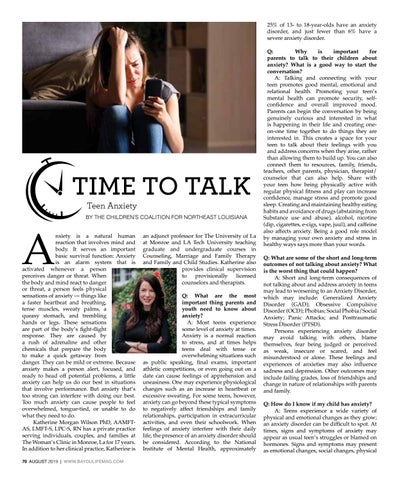25% of 13- to 18-year-olds have an anxiety disorder, and just fewer than 6% have a severe anxiety disorder.
Teen Anxiety
A
BY THE CHILDREN’S COALITION FOR NORTHEAST LOUISIANA
nxiety is a natural human reaction that involves mind and body. It serves an important basic survival function: Anxiety is an alarm system that is activated whenever a person perceives danger or threat. When the body and mind react to danger or threat, a person feels physical sensations of anxiety — things like a faster heartbeat and breathing, tense muscles, sweaty palms, a queasy stomach, and trembling hands or legs. These sensations are part of the body’s fight-flight response. They are caused by a rush of adrenaline and other chemicals that prepare the body to make a quick getaway from danger. They can be mild or extreme. Because anxiety makes a person alert, focused, and ready to head off potential problems, a little anxiety can help us do our best in situations that involve performance. But anxiety that’s too strong can interfere with doing our best. Too much anxiety can cause people to feel overwhelmed, tongue-tied, or unable to do what they need to do. Katherine Morgan Wilson PhD, AAMFTAS, LMFT-S, LPC-S, RN has a private practice serving individuals, couples, and families at The Woman’s Clinic in Monroe, La for 17 years. In addition to her clinical practice, Katherine is
70 AUGUST 2019 | WWW.BAYOULIFEMAG.COM
an adjunct professor for The University of La at Monroe and LA Tech University teaching graduate and undergraduate courses in Counseling, Marriage and Family Therapy and Family and Child Studies. Katherine also provides clinical supervision to provisionally licensed counselors and therapists. Q: What are the most important thing parents and youth need to know about anxiety? A: Most teens experience some level of anxiety at times. Anxiety is a normal reaction to stress, and at times helps teens deal with tense or overwhelming situations such as public speaking, final exams, important athletic competitions, or even going out on a date can cause feelings of apprehension and uneasiness. One may experience physiological changes such as an increase in heartbeat or excessive sweating. For some teens, however, anxiety can go beyond these typical symptoms to negatively affect friendships and family relationships, participation in extracurricular activities, and even their schoolwork. When feelings of anxiety interfere with their daily life, the presence of an anxiety disorder should be considered. According to the National Institute of Mental Health, approximately
Q: Why is important for parents to talk to their children about anxiety? What is a good way to start the conversation? A: Talking and connecting with your teen promotes good mental, emotional and relational health. Promoting your teen’s mental health can promote security, selfconfidence and overall improved mood. Parents can begin the conversation by being genuinely curious and interested in what is happening in their life and creating oneon-one time together to do things they are interested in. This creates a space for your teen to talk about their feelings with you and address concerns when they arise, rather than allowing them to build up. You can also connect them to resources, family, friends, teachers, other parents, physician, therapist/ counselor that can also help. Share with your teen how being physically active with regular physical fitness and play can increase confidence, manage stress and promote good sleep. Creating and maintaining healthy eating habits and avoidance of drugs (abstaining from Substance use and abuse), alcohol, nicotine (dip, cigarettes, e-cigs, vape, juul), and caffeine also affects anxiety. Being a good role model by managing your own anxiety and stress in healthy ways says more than your words. Q: What are some of the short and long-term outcomes of not talking about anxiety? What is the worst thing that could happen? A: Short and long-term consequences of not talking about and address anxiety in teens may lead to worsening to an Anxiety Disorder, which may include: Generalized Anxiety Disorder (GAD); Obsessive Compulsive Disorder (OCD); Phobias; Social Phobia/Social Anxiety; Panic Attacks; and Posttraumatic Stress Disorder (PTSD). Persons experiencing anxiety disorder may avoid talking with others, blame themselves, fear being judged or perceived as weak, insecure or scared, and feel misunderstood or alone. These feelings and experiences of anxieties may also influence sadness and depression. Other outcomes may include failing grades, loss of friendships and change in nature of relationships with parents and family. Q: How do I know if my child has anxiety? A: Teens experience a wide variety of physical and emotional changes as they grow; an anxiety disorder can be difficult to spot. At times, signs and symptoms of anxiety may appear as usual teen’s struggles or blamed on hormones. Signs and symptoms may present as emotional changes, social changes, physical
